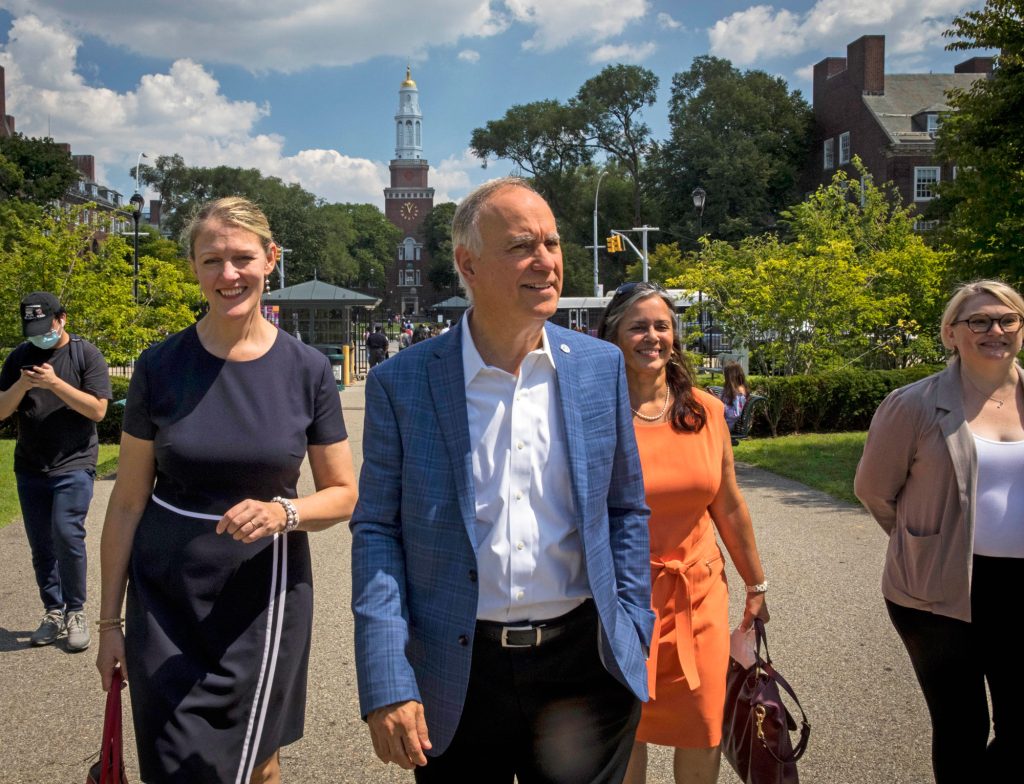
CUNY Chancellor Félix Matos Rodríguez (center) praises the mayor’s $16 million plan for career development, but some
members worry that the university may be putting too much emphasis on vocational programs. (Credit: Dave Sanders)
The CUNY administration, with the help of the City and State’s top leaders, has taken some important steps to make college more affordable, increase enrollment and enhance education at CUNY. But the only real way to bring CUNY up to its full potential, in the PSC’s view, is for Albany to enact the New Deal for CUNY legislation (ND4C), which calls for funding CUNY and making the university tuition-free once again.
This summer and fall, CUNY shared plans it believed would improve campus life for students and make college more affordable. In September, CUNY and Mayor Eric Adams announced the Inclusive Economy Initiative, a $16 million plan for career development that CUNY Chancellor Félix Matos Rodríguez said in a statement, “builds on proven models for connecting students to in-demand careers and expanding the capacity of CUNY campuses to grow and sustain talent pipelines with employers across multiple fast-growing sectors – such as tech, health-care and green jobs.”
OTHER PARTNERSHIPS
That announcement followed the unveiling of a CUNY joint venture with the New York City Economic Development Corporation, which awarded “six CUNY colleges…$3.98 million in city funding to help train the next generation of professionals for climate-smart careers,” according to a statement.
CUNY has also partnered with the New York City Council to address the decline in enrollment to recruit students who have left college without completing their degrees. City Council Speaker Adrienne Adams said in a statement, “This $4.4 million pilot initiative in the city budget will serve thousands of returning students this Fall, and hopefully tens of thousands more in future expansions.”
And with the support of the PSC, Governor Kathy Hochul launched in August a $150 million expansion of the Tuition Assistance Program (TAP) which will now provide TAP to approximately 75,000 additional students who are pursuing a degree part-time.
Last year, the union kicked off efforts to push the New Deal for CUNY, landmark legislation that would make CUNY free, increase the number of full-time faculty and staff and repair the university’s infrastructure. The legislation has dozens of supporters in both chambers of the state legislature. While the state budget agreement reached earlier this year increased full-time faculty, the union believes that the bill must be passed in order to correct years of disinvestment that has led to deteriorating campus buildings, declines in enrollment and not enough staff or faculty to meet students’ needs.
Sharon Utakis, the union’s vice president for community colleges and a Bronx Community College English professor, embraced many of these initiatives, but noted that none of them address CUNY’s core problem, which is a lack of full state funding.
Further, Utakis feared that the quick fixes that CUNY has announced would change the educational mission of the university. One program that concerns her is the Inclusive Economy Initiative.
“Initial funding is $16 million. Almost any additional money spent on CUNY students is good, but this initiative raises several questions and concerns. One aspect of the program is connecting students to internships, with an emphasis on students from community colleges. Will these be paid internships? How will our students be protected from exploitation by employers? The emphasis on community college students could be seen as part of the general push towards vocationalization of community colleges, with an emphasis on certificate programs and non-degree courses that lead to jobs, while many community college students enter college with the hope of transferring to a four-year school,” Utakis said.
NOT ALONE
Utakis isn’t alone in her concerns.
“All this focus on things like job programs are not designed to encourage critical thinking,” said Rebecca Smart, an adjunct lecturer in psychology at Borough of Manhattan Community College and Baruch College. Adding that many of these programmatic needs are made by administrators and not faculty, she said, “Pedagogy and curriculum decisions need to be in the hands of the people who are educators.”
“I’m pleased to see the governor’s extension of TAP to part-timers,” she said. “There has been too much emphasis in the past several years on students taking extra credits: 15 hours instead of 12, which is unrealistic for a great number of our students. Part-time TAP recognizes that our students sometimes are taking classes, working full-time and also caring for their families, all at the same time. If we want students in those situations to continue [to pursue] their college degrees, we need to make it possible for them to afford to attend part-time. Of course, TAP wouldn’t be an issue if we had a New Deal for CUNY, which would be a much better way to approach fully funding CUNY and making tuition free.”
STOPGAPS
Scott Cally, the PSC chapter chair and professor of theatre arts at Kingsborough Community College, concurred.
“These stopgaps are well and good and have their value, but it doesn’t solve the fundamental problem of why they’re needed to begin with, which is that we’re underfunded,” Cally said, noting that these initiatives are a short-term form of funding, covering for the fact that the university needs far more to meet student, faculty, staff and community needs. “I worry that when these programs come out, it gives the politicians a way to say they’re funding CUNY without funding CUNY.”
Published: November 30, 2022

